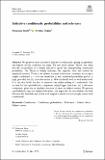Files in this item
Indicative conditionals : probabilities and relevance
Item metadata
| dc.contributor.author | Berto, Franz | |
| dc.contributor.author | Özgün, Aybüke | |
| dc.date.accessioned | 2021-04-20T10:30:02Z | |
| dc.date.available | 2021-04-20T10:30:02Z | |
| dc.date.issued | 2021-04-19 | |
| dc.identifier | 273246291 | |
| dc.identifier | 52588a6f-773b-4a82-a6af-0b696748575e | |
| dc.identifier | 000641191400002 | |
| dc.identifier | 85116622379 | |
| dc.identifier.citation | Berto , F & Özgün , A 2021 , ' Indicative conditionals : probabilities and relevance ' , Philosophical Studies , vol. First Online . https://doi.org/10.1007/s11098-021-01622-3 | en |
| dc.identifier.issn | 0031-8116 | |
| dc.identifier.other | ORCID: /0000-0003-3246-657X/work/92775600 | |
| dc.identifier.uri | https://hdl.handle.net/10023/23061 | |
| dc.description | This research is published within the project ‘The Logic of Conceivability’, funded by the European Research Council (ERC CoG), Grant Number 681404. | en |
| dc.description.abstract | We propose a new account of indicative conditionals, giving acceptability and logical closure conditions for them. We start from Adams’ Thesis: the claim that the acceptability of a simple indicative equals the corresponding conditional probability. The Thesis is widely endorsed, but arguably false and refuted by empirical research. To fix it, we submit, we need a relevance constraint: we accept a simple conditional φ→ψ to the extent that (i) the conditional probability p(ψ|φ) is high, provided that (ii) φ is relevant for ψ. How (i) should work is well-understood. It is (ii) that holds the key to improve our understanding of conditionals. Our account has (i) a probabilistic component, using Popper functions; (ii) a relevance component, given via an algebraic structure of topics or subject matters. We present a probabilistic logic for simple indicatives, and argue that its (in)validities are both theoretically desirable and in line with empirical results on how people reason with conditionals. | |
| dc.format.extent | 34 | |
| dc.format.extent | 516234 | |
| dc.language.iso | eng | |
| dc.relation.ispartof | Philosophical Studies | en |
| dc.subject | Conditionals | en |
| dc.subject | Conditionals probabilities | en |
| dc.subject | Relevance | en |
| dc.subject | Adams' thesis | en |
| dc.subject | Subject matter | en |
| dc.subject | BC Logic | en |
| dc.subject | T-NDAS | en |
| dc.subject.lcc | BC | en |
| dc.title | Indicative conditionals : probabilities and relevance | en |
| dc.type | Journal article | en |
| dc.contributor.sponsor | European Research Council | en |
| dc.contributor.institution | University of St Andrews. Philosophy | en |
| dc.identifier.doi | https://doi.org/10.1007/s11098-021-01622-3 | |
| dc.description.status | Peer reviewed | en |
| dc.identifier.grantnumber | 681404 | en |
This item appears in the following Collection(s)
Items in the St Andrews Research Repository are protected by copyright, with all rights reserved, unless otherwise indicated.

